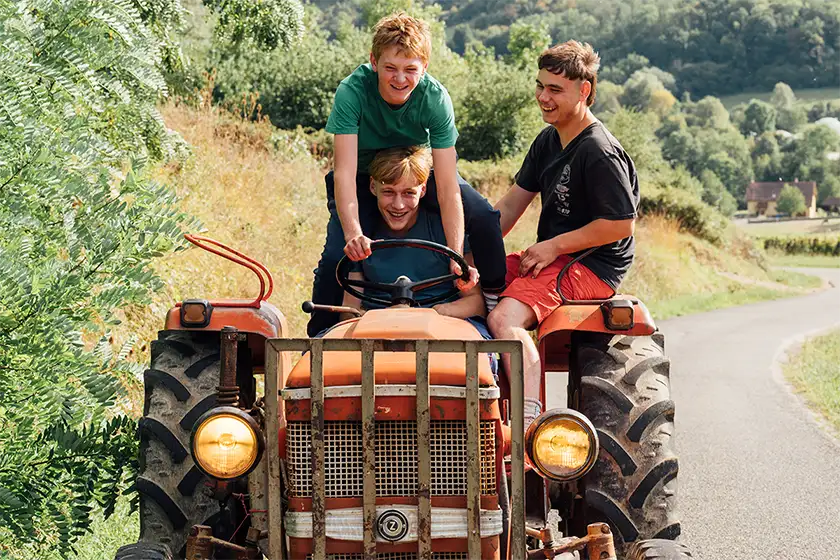Practice makes perfect for the protagonist of Louise Courvoisier’s Holy Cow, not only when it comes to making Comté cheese for a competition but also for becoming an adult.
Director: Louise Courvoisier
Genre: Drama, Coming of Age
Run Time: 90′
Cannes Premiere: May 17, 2024
Release Date: TBA
Louise Courvoisier’s Holy Cow (Vingt Dieux) opens with a 2 minutes long sequence shot that takes us to a fair in the French, rural region of Jura, where our protagonist, 18-year-old Totone (Clément Faveau), is dancing on a table without a care in the world. 90 minutes later, the film will end at a similar fair, but Totone will be a different person entirely.
When we first meet him, Totone is still a boy. As he dances on the table at the fair, other teenagers dare him to take off all his clothes, cheering him on, and he does it with a sense of euphoria. “Holy Cow!,” someone in the crowd shouts, in disbelief, and the fun continues.
We soon learn that Totone is not as socially adjusted as it would appear in that opening scene. Though he has two best friends, Jean-Yves (Mathis Bernard) and Francis (Dimitri Baudry), with whom he really gets along, he’s still inexperienced when it comes to girls and has yet to learn how to express his emotions in a way that doesn’t involve getting into fights. We soon understand why that is, when his father makes an appearance at the bar, a few days later, completely drunk, embarrassing them both.
Totone has other things on his mind that night – mainly, a feud with another boy (Armand Sancey Richard’s Cyril) who appears to be dating a girl with whom he almost had a one-night stand a few days before, and whom he thought he was seeing. But before he has time to even process his feelings, his father dies in a car crash, and our protagonist finds himself on his own, having to look after his 7-year-old sister Claire (Luna Garret), and in desperate need of money.
Since his dad used to work at a Comté cheese factory, Totone decides to do the same, but things don’t go as smoothly as he hoped, mainly due to his inexperience and some conflicts with the staff. But amidst the chaos, a few things happen that give our young protagonist a glimmer of hope: first, something seems to spark between him and young farmer Marie-Lise (Maïwène Barthelemy), whose cows are renowned for making the best milk. Then, he learns about a cheese competition his company is taking part in, where the winner would get 30,000€. Holy cow, indeed.

Right there and then, Totone decides that he’s going to make the absolute best Comté cheese in the region and win the gold medal. As we follow his attempts to do just that, with the help of his friends and sister, while navigating his new relationship with Marie-Lise, something unexpected happens: Totone grows up.
Storytelling-wise, Holy Cow doesn’t do anything new. On the contrary, it’s a little light on characterization, and there are too many coincidences that make this tale a little unrealistic. But Courvoisier’s film is so full of heart that it’s easy to overlook its flaws. With co-writers Théo Abadie and Marcia Romano, the writer-director creates a universe that’s so easy to inhabit, in a film that’s not really about a cheese competition; it’s actually about a boy’s journey to becoming an adult. One failure at a time, Totone grows into his own person almost by chance, without even fully realizing it, and learns the most important lesson of all: he doesn’t have to do it all on his own.
It’s in its central message, and the journey it takes to deliver it, that the film shines. With her refusal to overdramatize conflicts and constant focus on the movie’s central character, Courvoisier delivers such mature work that it’s astonishing to think that this is her feature debut. Through the apparently simple story of a boy learning to make cheese, the filmmaker tackles anything from identity to grief, legacy, masculinity, and what it means to be an adult. She does so with immersive camerawork, a fantastic score (François Abdelnour), stunning cinematography (Elio Balezeaux), and a unique sense of humor that make Holy Cow stand out in a crowded genre.
Also in his feature debut, Clément Faveau excels as the immediately likeable Totone, holding our attention in every scene, often without even having to speak. The other standout is Maïwène Barthelemy (also in her first appearance on screen!) as farmer Marie-Lise, who is not just Totone’s love interest but also a fully fledged, authentic character. Not only does Marie-Lise have a life outside of our protagonist’s universe, but she’s also the kind of female character we don’t often see represented on film, and Barthelemy makes her an unforgettable one too.
Once in a while, a film comes along that’s so charming and full of personality that you’re able to overlook all its flaws and simply let yourself be drawn into its world. To me, Holy Cow is one of those films, and the fact that it’s a debut from both the writer-director and most of its cast members makes it even more impressive. Keep an eye on Louise Courvoisier‘s work: we’re bound to be seeing great things from her in the future.
Holy Cow premiered at the Cannes Film Festival on May 17, 2024, winner of this year’s Un Certain Regard “Youth Award”.

 loudandclearreviews.com
loudandclearreviews.com
